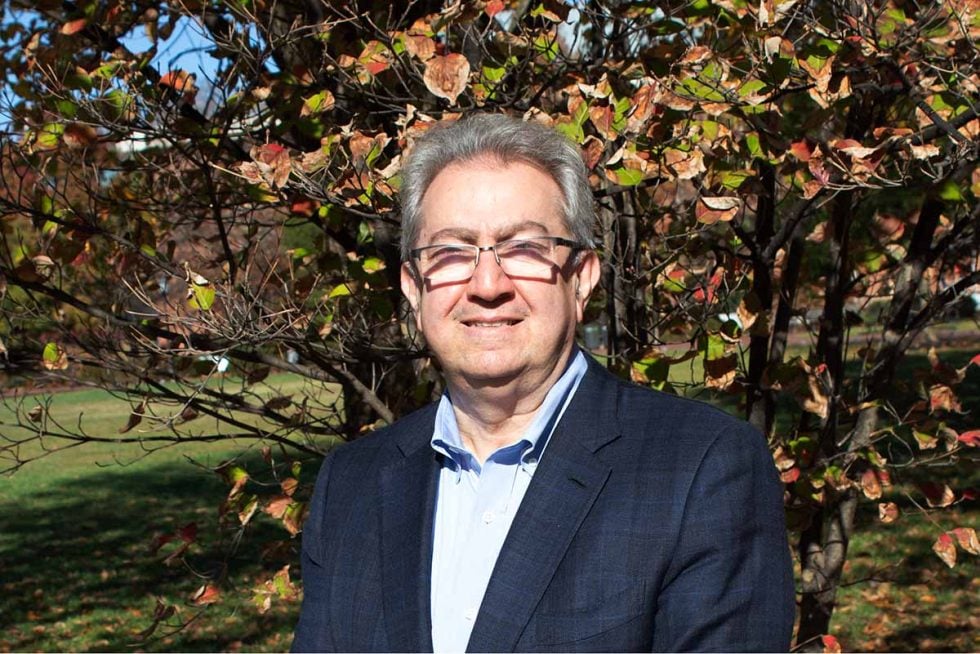Roger Hajjar, ’86, is the inaugural director of the Gene and Cell Therapy Institute at Mass General Brigham and the president, chief medical officer, and co-founder of Medera, a clinical-stage biopharmaceutical company developing novel gene- and cell-based therapies. A leader in cardiac gene therapy research, he has authored more than 500 publications. In recognition of his contributions to the field, he has received numerous awards, including the Doris Duke Clinical Scientist Award, the Distinguished Achievement Award and the Thomas W. Smith Award from the American Heart Association, and the Johns Hopkins Distinguished Alumnus Award.
Hajjar earned his bachelor’s of science degree in biomedical engineering at Johns Hopkins and a medical doctoral degree at Harvard Medical School and the Harvard-MIT Division of Health Sciences & Technology.
What are you most proud of professionally?
My most rewarding work is how I’ve advanced the field of cardiac gene therapy to the point where we’re very close to having the first cardiac gene therapy treatments for patients with all types of heart failure and specific cardiomyopathy. We’ve been performing clinical trials for many years, and the first approved treatment is around the corner. It’s an important accomplishment because heart failure symptoms cannot be treated with medications and there’s nothing to reverse the actual disease status of the heart muscle.
I was able to apply the knowledge I gained from my years at Hopkins working on muscle mechanics to my time at Harvard Medical School, where I sought to understand the molecular mechanisms of heart failure and to develop ways to target abnormal pathways in heart failure to reverse heart muscle dysfunction. From a lay perspective, this means that the therapy will not just treat symptoms but also reverse the disease to make the heart muscle beat better.
How did your Hopkins experience prepare you for success?
What I remember from my undergraduate time was the intense learning experience. It was everything that was promised—in-depth learning and in-depth teaching that went to the heart of subjects that I’d seen in high school.
My work in a biomedical engineering research lab at the Traylor Research Building on the medical school campus became the main reason that I became a clinician-scientist and went into academic medicine, focused on research. That experience carried over to medical school and beyond. There were techniques that I had learned in the Biomedical Engineering department at Hopkins that I brought to my new laboratories at Harvard Medical School; I was able to show them techniques they hadn’t seen before!
I have always thought of my Hopkins education as the platform of knowledge that propelled and allowed me to be much more effective in my journey in the medical clinical and research field. What I learned at Hopkins was truly transformative for my career.
Your biotech company, Medera, has several Hopkins connections. What benefit does that provide?
Medera’s three co-founders—me, Ronald Li, and Kevin Costa—all have a Hopkins connection. I was an undergrad, Ronald was a postdoc in the biomedical engineering department, and Kevin was a postdoc and a fellow in the biomedical engineering department. All three of us have, as Ron likes to say, the same ‘fabric of Hopkins.’ It’s pervasive, across different generations and different skill sets. We value each other’s expertise and the fact that we come from a place that has a very rigorous way of teaching and approaching problems.
What is the value of a Hopkins education?
Hopkins has a lot to offer, and students should take full advantage of everything—whatever intersects with their interests—because doing so provides such a strong base of knowledge and empowerment going forward.
I was on the medical school admissions committee at Harvard for 10 years or so. Hopkins students were known for their rigor, so when their applications came through, we knew exactly who we were dealing with: experts whose scientific expertise could be relied upon because they had gone through a rigorous and scientifically grounded teaching experience.

